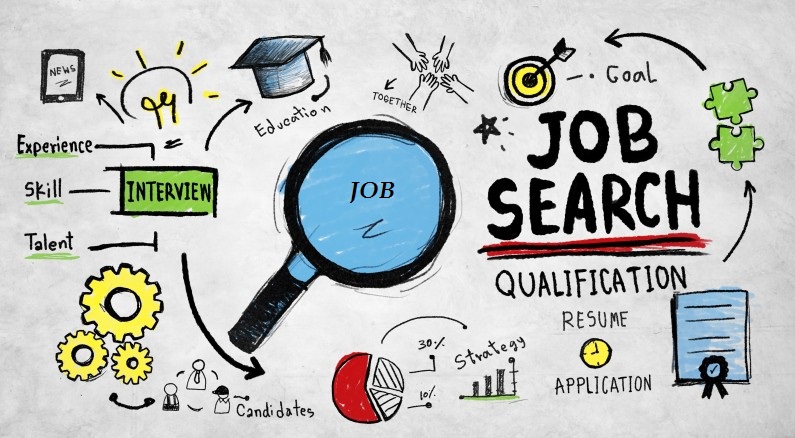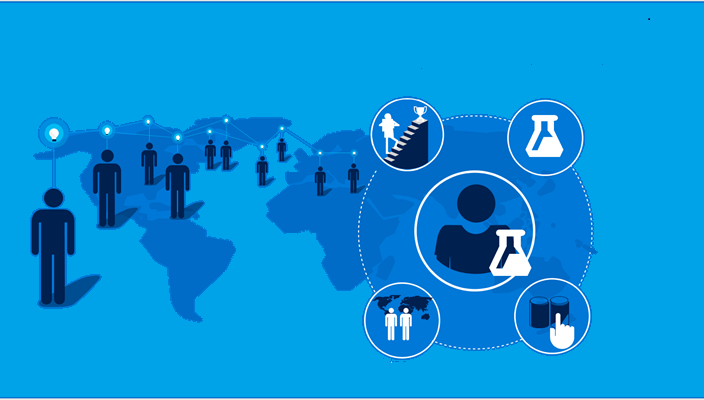


Use social media to make your job search more effective and efficient. We can see that social media profiles have become an important part of our everyday life, whatever technology or platform you choose you’re likely to have a few different accounts online. You can create your own brand by making your profiles online, especially when working in digital it is very important to realize what you add online!
Dos

Don'ts
As long as you’re conscious about what you put online, you’re on the right track! If you have any questions, don’t be shy! Head over to our LinkedIn, Twitter, Facebook or Google+. We practice what we moralize!, and drop us a line!
...
Read More

The value proposition of Cloud computing — the delivery model for digitalization and innovation has evolved from cost reduction and scalability to mobility and cognitive computing. However, the other benefit is a path to improve customer loyalty using cognitive services through a cloud to create personalized promotions and interactive customer support.
This thinking has extended the idea of a cloud assessment beyond traditional and advanced IT analytics that aimed to improve the customer experience and expectations. The purpose of this customer-centric approach is not which cloud is the best fit for any application; instead, it should, which cloud is the most innovative in adding to hosting services.
The cloud suitability assessment in traditional approach is to evaluate the IT systems using prearranged criteria and to identify the best suitable cloud hosting environment. By implementing such environment you can evaluate cost reduction, agility, scalability, and flexibility. However, such assessments often result in creating a hybrid cloud (private and public) for enterprise-level customers.

While based on every organization’s IT need and policies, it is crucial to tailor assessment criteria which are typically included on latency (performance), accessibility, hardware dependency, data security/privacy and demand certainty. Thus, the end result is to migrate your application to the cloud, but that is not enough to be competitive in many markets today.
However, these assessments are like foundations to new analysis which aims to transform traditional IT systems into cloud-based systems to enhance the customer based services.
This new cloud assessment requires added evaluation criteria’s, such as cross-platform compatibility, integration involvedness, open technologies, and cognitive computing applicabilitys. These criteria’s can overlap with architectural design principles, and enable innovative services through IT systems running in the cloud.
Here are some questions that may help you to make out any gaps and achieve your innovative goals that go beyond legacy cloud migration.
This comprehensive assessment will make your systems or applications land in a cognitive ready cloud environment so you can speed up the design and implementation phase to innovative services.
The potential for these services is every time unlimited, so you need to consider the new insights made possible by cognitive computing. With the help of cognitive services process, you can see the tremendous amount of structured and unstructured data generated by billions of mobile devices every day.
It’s time to go beyond migrating your applications and systems into the cloud, and also look into its readiness for innovations how cloud and cognitive services could revolutionize your customer experiences. By doing so you could drive your digital transformation.
...
Read More

Your CV plays a vital role in explaining you better without your presence. This is the first step that makes you through to reach the right door. Once your CV reaches out the right place it’s up to you to impress the recruiter and prove that you are really worth of the position offered. Here are the key points which will help you make good impression from the get-go.
You need to be very active when you have this type of question asked. The interviewer wants to see how serious you are about this position and how good you have prepared yourself. Research well before you hit the interview panel; your homework on the company will help you to stand out of the crowd. Be very clear why they need to get in to their company and the reason you are looking for new job should also be very impressive.
This is the universal question asked by any interviewer. Before you starts explaining yourself list all your skills and how they will be directly applicable for the company if they pick you. Project your achievements from your previous employers, preferably quantified sales, and savings on paper clips. Do not focus on what you want to get out of this job you are interviewing for, as this should be only all about you and what they will get if they hire you.
When you get this type of questions, you have to well prepare yourself and explain how well you can work with the team. Elaborate yourself and give the best examples of your team achievements and recognition you have received. Tell how strong you are alone and how well you will be equipped when you are with a team as per requirements.
It’s the time you have to praise yourself before the interviewer. While doing that give specific examples that you have achieved greatness in the past and tell them if you have solved any serious issue for your company’s biggest client. Whatever nice and tangible achievement makes you special can be memorized and get ready to deliver it when prompted.
This is the final question which gives you a hint that you are probably doing well. Be very clear and indicate how much you are expecting. So that the interviewer can calculate how much money they can make from you and when to begin doing so. Do not look so desperate, which will not help you any way. Indicate that you will be flexible and that there will be a way to work out both the financials and start date, should you get to that stage.
Finally, what is your experience of these five questions vs. small talk in interviews?
...
Read More

Stress in any and every organization has become common today, but excess stress can interfere your personal and professional life. This can be a cause to break down your professional network which will in fact impact on the productivity and spoil your physical and emotional health. Your ability to deal with it can mean out of the difference between success and failures.
It’s not in your hand to control everything at your workplace, but this doesn’t mean that you are powerless – when you are struck in any difficult situation. Finding ways to manage workplace stress or looking out to opt out of hat job will not be that helpful as it will give you temporary relief, but rather focusing on one thing will always be within your control.
For workers anywhere, the financial system may feel like an emotional move with layoffs and budget cuts which result increased fear, insecurity, and high-level of stress.
Your emotions should be communicable as stress can impact the quality of your interactions with others and sometimes many people lose their prospects because of this. The better you manage your stress, the more you'll positively influence those around you, and the fewer others stress will negatively affect you.
Let us look at some more tips that will help you to come out of stress and help yourselves to grow professionally and personally.
There are many ways to reduce both your personal stress and the stress you get on the job side. They include:
When you feel stress at your workplace, you lose confidence and become irritable or introvert. This is the first reason which will make you less effective and less productive in your job. Thus, it also makes your work less rewarding. When you start ignoring the warning signs of stress at your workplace it leads to bigger problems. Chronic and intense stress can also lead to physical and emotional health problems.
Signs and symptoms of excessive stress at job
Common Causes of excessive Stress
When you are unable to manage stress at work, improve your personal life, as it adversely impacts your health and makes you stress-free. When your own needs are taken care of, you will be stronger and resilient to stress. The better you feel, the better you’ll be equipped to manage your work stress without becoming overwhelmed. Taking care of yourself doesn’t mean that you overhaul your total lifestyle. Small to small things can lift up your mood, increase your liveliness, and make you feel that you’re back in the driver’s seat again.
Start your day with positives and always take things one step at a time, as this helps you to make more positive lifestyle choices, and you can soon notice a decline in your stress levels, both at home and at work. Get into regular exercise as it is the first stress burner; listen to good and soothing music, read good books, eat your favorite food which will not only increase your energy levels but help you to take the physical stress. To be positive in every situation is always suggestible by experts; so start adapting it. Break up your activities and do what you like most first, last but not least have a sound sleep as this will help you to wake up with a fresh mind and start your day with a refreshing way.
When your work and workplace stress threatens you, there are simple steps to regain control over yourself in some situations. Always be the first to adapt the ability to build a sense of self-control in stressful situations, as this will help you to be well-received by your managers, coworkers, and subordinates alike, and which also lead to good relationship building at your workplace.
As we discussed, every job today is very stressful, retaining a large measure of self-control and self-confidence by learning and practicing emotional intelligence has also become very important in today’s lifestyle. Emotional intelligence is the skill which helps you to manage your emotions in positive and practical ways and use them properly. When it comes to love your work and increase the productivity, emotional intelligence matters just as much as intellectual ability. By adapting this skill you can communicate with others and draw people to you, one can easily overcome differences, fix wounded feelings, and learn how to defuse tension and stress.
Many of us take job stress and make their jobs worse with negative thoughts and behavior. Breaking out your stress at your workplace will never help you, but it makes your job more complicated. Thus to get rid of such situations one has to turn around these self-defeating habits so that you can very easily be able to handle the situations.
No project, situation, or decision is ever perfect, so trying to achieve perfection on everything will just add needless pressure to your work and day. Setting unrealistic goals and struggling to reach them is setting you up to fall short. Always aim to do your best, so that no one will ask for more than that.
Be on time and do not run late, set your clocks and watches fast to give yourself extra time. Do not make your desk mess, throw away the clutter; and make sure that you are aware where everything is as it saves your time and cuts stress. Make to-do lists and plan your day to make feel less overwhelmed.
The manager should play the major role as to keep stress levels in the workplace to a minimum. As they can act as positive role models, particularly in times of high stress. If the manager can remain calm in stressful situations, it is much easier for employees to also maintain their calm.
In addition, there will be many organizational changes that managers and employers can make to reduce stress in the workplace. That include:
Communicating effectively at work can help you to improve the teamwork; decision making will be easy with problem-solving techniques. That means not just by understanding the words or the information being communicated, you can also understand the emotions the speaker is trying to communicate within the group.

...
Read More

When you begin on a job search or career change, having expert guidance will definitely help you to face the challenges with confidence. Building the relationship with your client and the candidate is the first step to any recruitment consultants today which leads to great heights. Recruitment is all about building the relationship with the recruiter, client, candidate and the recruiting staff. When working with recruitment agencies you have to be proactive and collaborative as it gives you an automatic benefit in the job market. Here are some tips that help you to build a strong relationship with the recruitment firm that’s based on trust, respect, and confidence.
Before building the relationship with the consulting firms it is very important that you have to stand in the market as you’re the specialist in all specified industries. Make sure you’re signed up to industry-specific publications which will help you to know what’s happening in the wider market.
Distinguish yourself. Carry out your ability that explains why you’re more competent than your peers. This sets you to stand apart from the hundreds of other job hunters. As a candidate this the way you need to develop your narrative; then it’s the job of the recruiter to grab you and sell you to prospective employers.
Always maintain transparency and ensure that you share the complete details of yours and the positions you are looking in for. This helps the recruiters understand the opportunities that interest you.
Adopting an honest approach and disclosure of your employment history will allow your consultant to help you to land in a good workplace, as consultants are more likely to have a strong relationship with the hiring managers. The consultant can act as the ambassador for you when you are in need of exposing your resume; for example: if you have any gap in your employment history and you’ve appropriately disclosed possible issues, then consultants are the right contacts to influence the opinion of your hiring manager in your favor.
Proceeding to an interview, the consultant will probably provide you with insight about the company, rounds that you have to face and the personality of the hiring manager. Make sure that you clarify everything before you attend the drive and ask your consultant for the information that demonstrates you about the employer. Remember, that a good candidate will always reflect well on the consultant also.
Once you are done with your interview, remember to call the consultant and share the details of what took place and what went wrong. By keeping your consultant informed, you’ll not only move forward positioning with their client but will also build a good relationship with them.
...
Read More